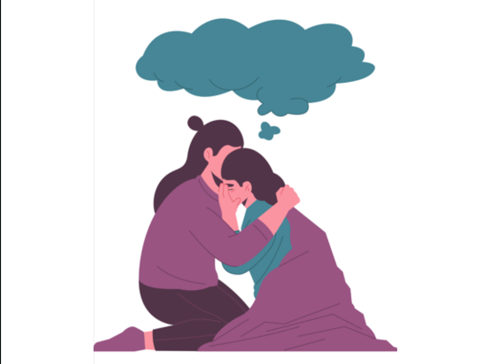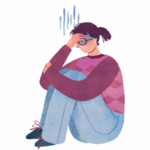When to Seek Help
Mental illness is what keeps you so immobilized, isolated, and even afraid. There are simply too many of them around who are not being treated because of stigma, judgment, or total cluelessness as to how to proceed in getting help. Seeking help isn’t a weakness—and one of the most powerful, freeing things you can do towards getting well. It deals with the responses to the queries why seek assistance, what typically comes in the way, where one can obtain inexpensive assistance, and step by step, how to discover the way to gain better mental well-being. Learning About Mental Illnesses and there are more advanced levels of types and mental illnesses. There will be some with depressive mood states, anxiety disorder, post-traumatic stress disorder, or bipolar disorder, and some are burned out, stressed out, grieving, or overwhelmed.
Signs
Signs that let you know your mental health needs to become an even greater priority:
- Feeling of long-term sadness, hopelessness, or emptiness
- Excessive focus on worrying, panic, or avoidance behavior which is becoming distraction
- Steer clear of others, family, or activity
- Abnormal mood swings while sleeping or eating
- Difficulty concentrating or deciding
- Numbness and alienation
- Self-injury or suicidal ideation
It’s a bit of catch-the-warning-signs at first because mental illness, like physical illness, is more difficult to deal with once it has slipped by unchecked.
Why Seeking Help Is Important
Having the support when you just need it for beginners. People do too much and accomplish too much and then complain it just won’t happen.
Reaching out is hip in so many ways:
- Validation and relief: It is a healthy way of unloading built-up emotion. Getting through trauma, tension, and twisted thinking can be learned from mental health therapists.
- You don’t have to be alone: Spilling it all to people, you can come to the discovery that you are not alone in such suffering. Terrible issues don’t happen as tragedies if they are given an early resolution.
- Hope and recovery: Recovery once more is hope ushered in by therapy, counseling, and support groups.
Universal Barriers to Seeking Help
Although they may know that they are functioning poorly, they may not be positioned to seek help. Proceeding along the steps toward help-seeking starts with a recognition of help-seeking barriers:
- Shame and stigma: Primarily, they worry about being stigmatized or “weak” or “broken” labeled.
- Cultural expectations: Individualist and non-permissive cultures are some, which either inappropriately close or are not open to free expression of emotion.
- Money problems: The cost of treatment, drugs, or a bed is just too large.
- Obstacles to access: The mentally ill live in ghetto or rural communities that as a group have no mental health clinics in the area.
- Suspiciousness: Glum about attempting “therapy won’t help” or having any idea what to expect does create a barrier.
Bulldozing over barriers makes their power moot. You do not have to attempt it alone—baby steps can be taken.
Who You Can Turn To
When you require it, help of all types and varieties awaits you. That which suits your needs will be chosen out of necessity and availability.
- Family and Friends
It is a cozy room in which to sit and converse with an intimate, hand-in-hand individual. To sit and converse in “I am ill, let us speak” can be therapeutic. Members can offer support of an effective nature, counseling, and brokering to professional care.
- Mental Health Professionals
THERAPISTS and COUNSELORS: Professionals who are certified and practice in individual, group, or family therapy.
Psychiatrists: Board-certified physicians with authorization to diagnose and prescribe.
Psychologists: Licensed counseling conversation, testing, and behavior change therapists.
Social workers: The professionals who refer you to agency groups and counsel you in counseling.
- Support Groups
Peer or counseling support groups are very empowering. To hear people who’ve been there and to be able to give assistance in the form of paying it forward is what keeps you not alone in the isolation still present.
- Hotlines and Crisis Services
Hotlines are 24/7, judgment-free, free help if suicidal or in crisis. There is a mental health hotline in every nation where you can call and text.
- Online Counseling and Apps
Online facilities offer counseling using video counseling, messaging, and chatting. Guided meditation, writing work, and stress-management training are offered in mental health apps for continuous care.
The most terrible thing about seeking help is what you say to them. You’re not necessarily smart—you just need to explain things to them.
- To friends/family:
“I have been really depressed and think I might need help.”
“Take me out for a while for a while. I’ve had some sort of mind sickness issue.”
“I haven’t been too great. Would it be okay to pop by now and again?”
- To an employer
“I don’t know what, but I do know that I am sick.”
“I’m forever on edge and it is carrying over into my life.”
“I am in desperate need to speak with someone.”
Fear of Judgment Fight
People suppress their thoughts and feelings because they don’t want to be judged. Remember:
- Mental illness is not something to be ashamed of as millions of people to go through it.
- You can speak it out loud and all will be well, and other people are reassured that they can do the same.
- They will likely respond in a sympathetic manner, but not an intelligent one, when a person speaks up and shares it.
- You are not weak for asking for help. Get strength to ask for help, don’t bottle it up.
Practical Tips for Taking a Leap of Faith
Tips to guide you to get ready and seek help even when you feel uncomfortable:
- Get your feelings down on paper. Writing it out will be more clear and easier to explain to another human being.
- Slow down. Tell one good friend first before enlisting the professional.
- Prepare yourself in advance. Seek help from therapists, hotlines, or websites.
- Make an appointment. Even to schedule an appointment is in the right direction.
- Just remember, okay is okay. Mental health advice is simply a part of overall health advice.
- Mark milestones. Every step, no matter how tiny, must be celebrated.
Self-Care: A Friend
When therapy is not even an option, self-help tasks are just as much a part too to enjoy a bit of. They’re empowering-healing by oneself, not therapy.
Mindfulness and meditation to deal with woolly thinking.
Physical activity and exercise to lift mood by release of endorphins.
Balanced nutrition in order to be at optimal level of energy and alertness.
Sleeping pattern to replenish brain functioning.
Art, writing, or music as an expressive activity in order to put feeling into words.
Take an outdoor stroll to keep anxiety under control and improve your mood.
Strength and stability will be developed best out of self-care, and the process can discourage trouble in life and be reinforced with professional support.
When There Is Need for Help Immediately
Psychiatric illness at times falls to the level of an open crisis phase in which time cannot be lost. Certain of the features of an open crisis phase are the following:
Suicidal ideation or suicidal intent
- Hopeless statements, i.e., “I don’t do it anymore”
- Self-neglect (showering, dining, etc.)-being extremely responsible or staying away from heavy things
- In this case, dial emergency services, a crisis line, or your doctor. Your safety is always important, and someone can assist, specially trained people to assist.
Establishing Caring Culture
Apart from treatment of the patient, society can assist other individuals experiencing mental illness. De-stigmatization of stereotypical behavior, truthfulness in speech, and health education maximizes opportunity where care is the rule rather than the exception.
School, work, and community can get in the way of:
- Treatment and education on mental health
- Establishing open routine reporting of emotional suffering and stress
- Affordable therapy and counseling during times of need
- Having time to set a boundary when one is ready to expose his/her issue
Resilience Stories
There are just too many tales of people from everywhere who battled the disease of mental illness and began again. The diversity of healing brings balance to healing. Some heal with medicine and therapy, some with group therapy, but they most commonly heal from the other.
They have one thing in common: if someone goes into treatment on their own, they are already pretty far along toward wellness. No one ever has to suffer.
The Future of Seeking Mental Health Services
Where knowledge is higher, there are more gear plans. Teletherapy, use of cellular phones in mental illness, sensitive care attuned to culture, and intervention in the community become a reality every day. Care of mental illness will be an increasingly large component of the school system, work environment, and health care system as a function of far more where needed in two years.
Stigma is one that will be shattered through learning of mental health as being as precious as bodily. Increasingly, it will be the norm to seek assistance because one will fit in for being a normal precaution already so to go see a doc to be checked out.
If it does not feel good to you in doing the business of taking care of your head, keep three things in mind: that it is never cowardly, but thrilling, to be helped. We all get to come, to heal, and to get fixed. If you start with the act of honesty with a friend, a phone call to a helpline, or your very first therapy session, it does matter.
You have not come to start the healing process yet, but to step out and claim it is the way. There are people who can help you, and you need not be alone here to battle. Being strong today and asking for help can be the key to change to open the door to an even better tomorrow.



